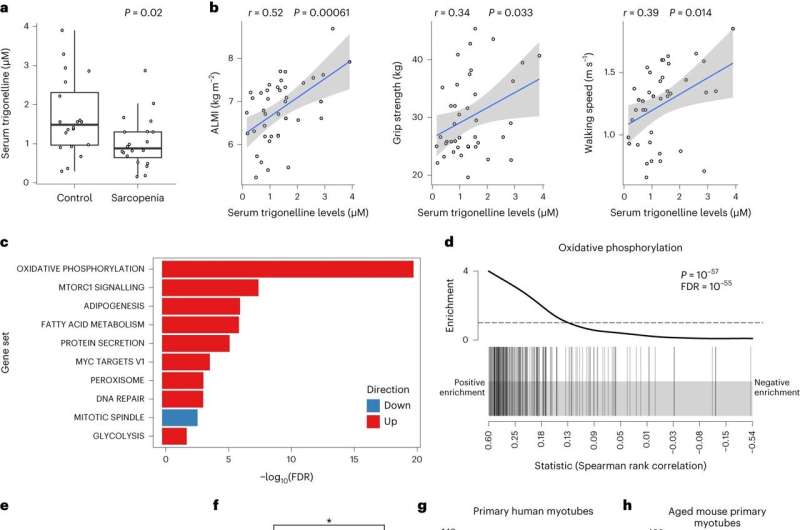This article has been reviewed according to Science X's editorial process and policies. Editors have highlighted the following attributes while ensuring the content's credibility:
fact-checked
trusted source
proofread
Study finds natural molecule in coffee and human body increases NAD+ levels, improves muscle function during aging

A research consortium led by Nestlé Research in Switzerland and the Yong Loo Lin School of Medicine, National University of Singapore (NUS Medicine) made a recent discovery that the natural molecule trigonelline present in coffee, fenugreek, and also in the human body, can help to improve muscle health and function.
In an international collaboration among the University of Southampton, University of Melbourne, University of Tehran, University of South Alabama, University of Toyama, and University of Copenhagen, the work builds on a previous collaborative study that described novel mechanisms of human sarcopenia.
Sarcopenia is a condition where cellular changes that happen during aging gradually weaken the muscles in the body and lead to accelerated loss of muscle mass and strength and reduced physical independence.
One important problem during sarcopenia is that the cellular cofactor NAD+ declines during aging, while mitochondria, the energy powerhouses in our cells, produce less energy. The study team discovered that levels of trigonelline were lower in older people with sarcopenia.
Providing this molecule in pre-clinical models resulted in increased levels of NAD+, increased mitochondrial activity, and contributed to the maintenance of muscle function during aging.
NAD+ levels can be enhanced with different dietary precursors like the essential amino acid L-tryptophan (L-Trp), and vitamin B3 forms such as nicotinic acid (NA), nicotinamide (NAM), nicotinamide riboside (NR) and nicotinamide mononucleotide (NMN).
Assistant Professor Vincenzo Sorrentino from the Healthy Longevity Translational Research Program at NUS Medicine added, "Our findings expand the current understanding of NAD+ metabolism with the discovery of trigonelline as a novel NAD+ precursor and increase the potential of establishing interventions with NAD+-producing vitamins for both healthy longevity and age-associated diseases applications."
Nutrition and physical activity are important lifestyle recommendations to maintain healthy muscles during aging. "We were excited to discover through collaborative research that a natural molecule from food cross-talks with cellular hallmarks of aging. The benefits of trigonelline on cellular metabolism and muscle health during aging opens promising translational applications," said Jerome Feige, Head of the Physical Health department at Nestlé Research.
The study is published in the journal Nature Metabolism.
More information: Mathieu Membrez et al, Trigonelline is an NAD+ precursor that improves muscle function during ageing and is reduced in human sarcopenia, Nature Metabolism (2024). DOI: 10.1038/s42255-024-00997-x


















